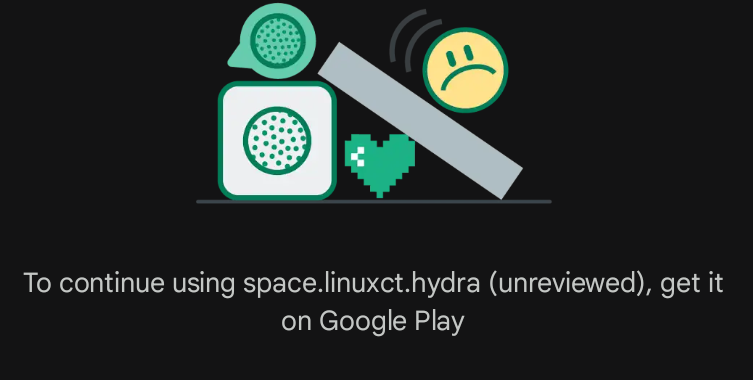You might sideload an Android app, or manually install its APK package, if you’re using a custom version of Android that doesn’t include Google’s Play Store. Alternately, the app might be experimental, under development, or perhaps no longer maintained and offered by its developer. Until now, the existence of sideload-ready APKs on the web was something that seemed to be tolerated, if warned against, by Google.
This quiet standstill is being shaken up by a new feature in Google’s Play Integrity API. As reported by Android Authority, developer tools to push “remediation” dialogs during sideloading debuted at Google’s I/O conference in May, have begun showing up on users’ phones. Sideloaders of apps from the British shop Tesco, fandom app BeyBlade X, and ChatGPT have reported “Get this app from Play” prompts, which cannot be worked around. An Android gaming handheld user encountered a similarly worded prompt from Diablo Immortal on their device three months ago.
Google’s Play Integrity API is how apps have previously blocked access when loaded onto phones that are in some way modified from a stock OS with all Google Play integrations intact. Recently, a popular two-factor authentication app blocked access on rooted phones, including the security-minded GrapheneOS. Apps can call the Play Integrity API and get back an “integrity verdict,” relaying if the phone has a “trustworthy” software environment, has Google Play Protect enabled, and passes other software checks.
Graphene has questioned the veracity of Google’s Integrity API and SafetyNet Attestation systems, recommending instead standard Android hardware attestation. Rahman notes that apps do not have to take an all-or-nothing approach to integrity checking. Rather than block installation entirely, apps could call on the API only during sensitive actions, issuing a warning there. But not having a Play Store connection can also deprive developers of metrics, allow for installation on incompatible devices (and resulting bad reviews), and, of course, open the door to paid app piracy.



That seems likely. The question comes down to where the line should be drawn. Allow the apps the be installed and then when the data is eventually reported/found by the app owners to have them file law suits against those who are “stealing” from them, or to not allow the cracked application to be loaded in the first place, which is easily disguised as a security protocol because if an app has code in it that is not originally supposed to be there, it is very possibly a form of malware, which then can hurt the users in the long run or short run if it actually acts malicious and starts doing shit like old school viruses did on PC.
People want to say we own the device so we should be able to do whatever we want, but blatantly allowing people to install cracked apps with keyloggers onto their phones unintentionally will get them sued, and ultimately hurt how many people stay using their products.
Imagine every user and password with the site listed was suddenly just accessible by everyone. It would be a hellscape of credit card companies trying to stop accounts because you order 18 pizzas off the dominos app in Georgia, and another 13 sandwiches in the burger king app at the same time in Jersey.
We need to have the freedom to load apps we trust, but if you look at the standard user base, that’s who they have to make the phones for.
Could do something like make the users agree to terms by taking the phone into developer mode that makes them non responsible somehow? Might not hold up in court when they get sued though. “All the photos I took on my phone got shared online”
It has been 16 years since Android came on the scene. Why do you think that these things are going to become such a big issue now in 2024 and beyond?
I think things are fine the way they are, we don’t need to interfere, unless for profits ofcourse.